

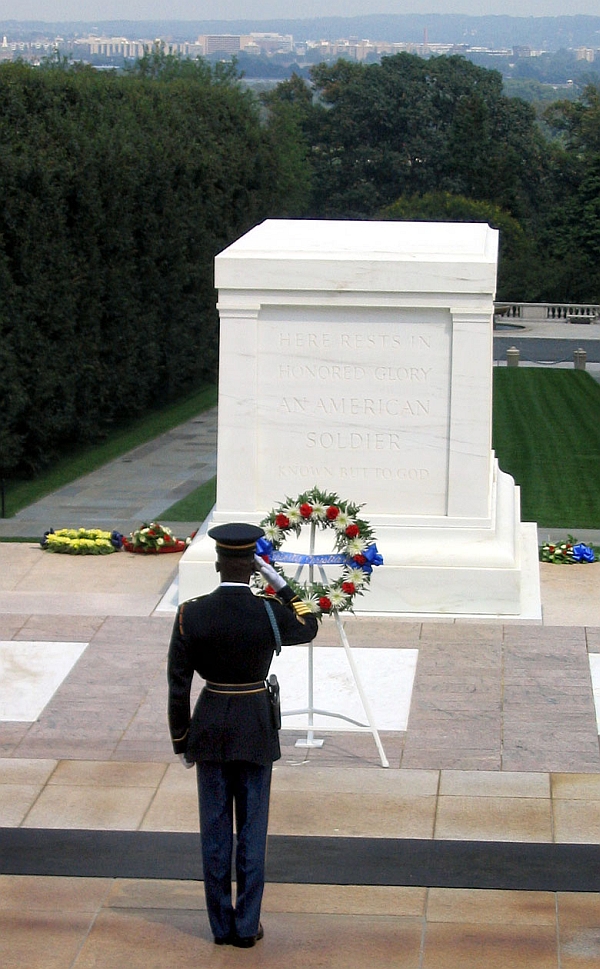
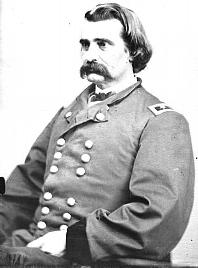 Major General John A. Logan |
The
First
Official Memorial Day
The first
national celebration of Memorial Day took place May 30, 1868,
at Arlington National Cemetery.
In 1868, General John A.
Logan issued General
Order Number 11, designating May 30 as a "Memorial
Day." He declared it
to be: ". . . For the purpose of strewing with flowers or
otherwise decorating
the graves of comrades who died in defense of their country during the
late rebellion, and whose bodies now lie in almost every city, village,
and hamlet churchyard in the land." The national observance still takes place there today, with the placing of a wreath on the Tomb of the Unknown Soldier and the decoration of each grave with a small American flag. In 1971, federal law changed the observance of the holiday to the last Monday in May and extended it to honor all those who died in American wars. |
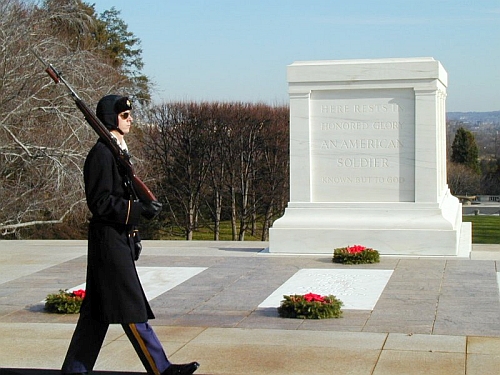 |
The Sentinel's Creed My
dedication to
this sacred duty |
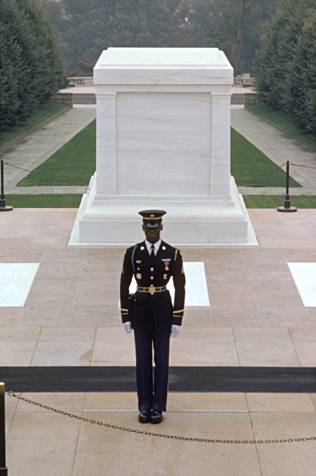 |
 |
The Tomb is guarded 24 hours a day, 7 days a week. A Sentinel has been on duty in front of the Tomb every minute of every day since 1937. The Sentinel does not change the way he guards the Tomb, even at night when there is no one around. Whether under a blazing sun, unsheltered from driving rains, or in freezing snow, they perform their duty with great precision and military bearing. The Sentinels do this because they feel that the Unknown Soldiers who are buried in the Tomb deserve the very best they have to give. During his walk across the Tomb the Guard takes 21 steps. It relates to the twenty-one gun salute, which is the highest honor accorded any military or foreign dignitary. As the Guard begins his return walk he does not execute an about face. He stops on the 21st step, then turns and faces the Tomb for 21 seconds. Then he turns to face back down the mat, changes his weapon to the outside shoulder, counts 21 seconds, then steps off for another 21 steps down the walk. He faces the Tomb at each end of the 21 steps for 21 seconds. The Sentinel then repeats this repeatedly until he is relieved at the Guard change. The Guard is changed every thirty minutes during the summer (Apr. 1 to Sep. 30) and every hour during the winter (Oct. 1 to Mar. 31). During the hours the cemetery is closed, they change the guard every two hours. To prevent intruders, the Sentinel always carries and points his weapon away from the Tomb keeping it between him and any potential threat. Only under extraordinary circumstances will the guard speak or break his silence. The guard will issue a warning if anyone attempts to enter the restricted area around the Tomb, but first will halt and bring his rifle to port arms. I have seen a number of internet email items reporting that in September 2002 during Hurricane Isabel the Sentinels were given permission to abandon their duties and seek shelter, and that they refused. That story is false and no such permission was given. However, they never put the personal safety and welfare of the Sentinels at risk. It is a good story though and it accurately symbolizes the determination and dedication of the great young men that guard the Tomb. Another false rumor regards the personal life of the Sentinels stating that they can never, for the rest of their lives, swear in public or drink alcohol. They do not allow the Sentinels, or any other serviceman, to disgrace the uniform but he may swear and is permitted to drink anything he wants but, of course, no alcohol while he is on duty. |
|
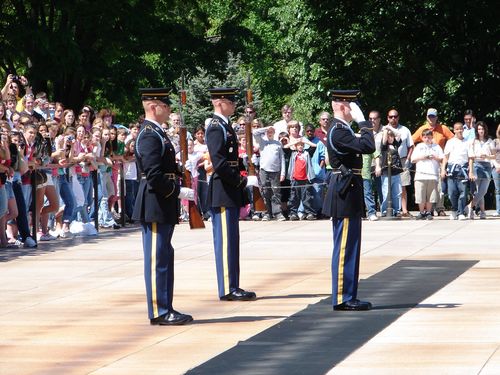 |
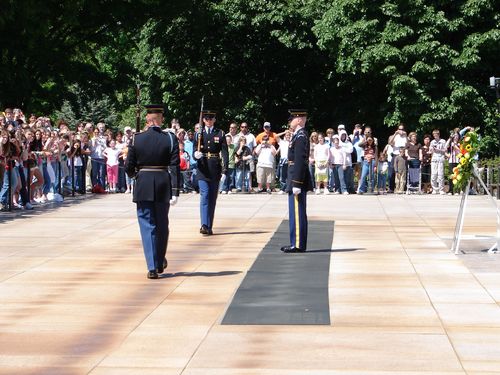 |
| Above:
Changing of the Guard. The changing of the guard ceremony is conducted every hour in winter time, and every half hour during summer daylight hours to provide visitors ample opportunity to witness one of the Army's proudest traditions. As the active sentry nears the conclusion of his walk, a uniformed relief commander enters the plaza to announce the Changing of the Guard. When the Sentinel assigned the next walk leaves the guards' quarters, he unlocks the bolt of his M-14 rifle to signify that he is ready to begin the ceremony. The relief commander approaches the Tomb, slowly salutes, then faces the visitors and requests silence during the ceremony. As the new Sentinel approaches the relief commander slowly and with great precision, conducts a white-glove inspection of the Sentinel's weapon. The two then march to the center of the mat where the duty Sentinel stops his walk, and all three men salute the Tomb. "Pass on your orders." the commander instructs the active Sentinel. "Post and orders, remain as directed." He replies. "Orders acknowledged." Answers the relieving Sentinel, who then steps into position at the center of the black mat. As soon as the relief commander passes, the new Sentinel begins his own walk, 21 paces, turn and pause for 21 seconds, turn and pace 21 steps, and then repeat the actions without distraction until relieved by the next Changing of the Guards. Source: The Sentinels do not wear rank insignia on their uniforms, so they will not outrank the Unknowns, whatever their rank may have been. |
|
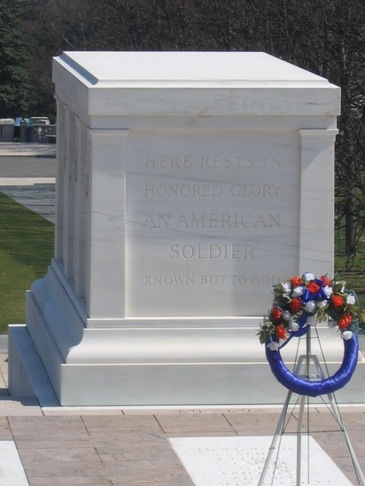 |
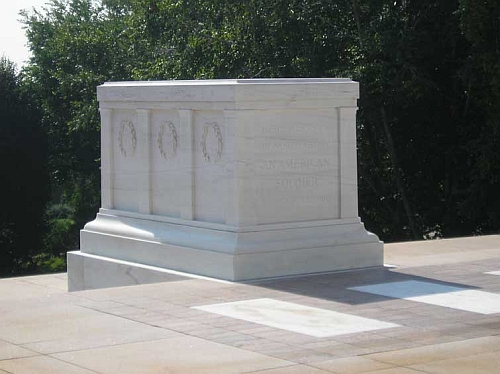 |
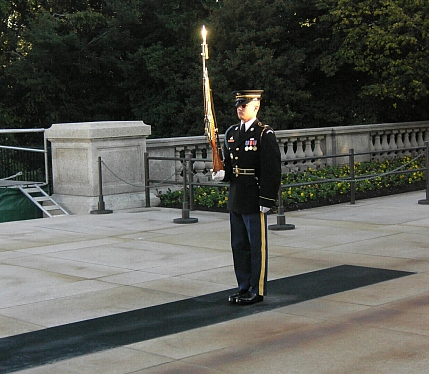 |
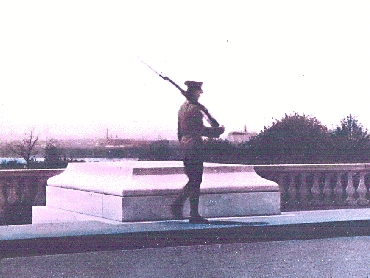 Original Tomb Of The Unknown Soldier - 1921 |
November 21, 1921 the body of an unidentified soldier, killed in France, was laid to eternal rest in the plaza of the Memorial Amphitheater. That soldier represents all of the unidentified and missing soldiers from World War I. On Memorial Day, 1958, the remains of two other unknown soldiers—one of whom had died in World War II, the other during the Korean War—were buried in the tomb, which was renamed the Tomb of the Unknowns. Remains of an unknown soldier from the Vietnam War were interred here in 1984, but later investigations revealed the soldier's identity, and they were removed. Because of recent medical and scientific advances in DNA studies and other methods of identifying our fighting heroes there will probably not be any future additions to the Tomb. For additional information on Arlington Cemetery, the Tomb Of The Unknowns and the Sentinels who guard the site, please visit the webpages for the links below. |
|

Nation Visitors Since March 8, 2013